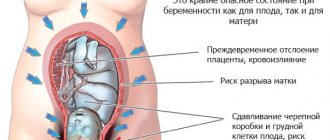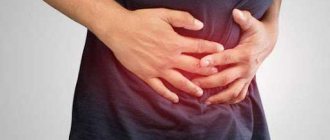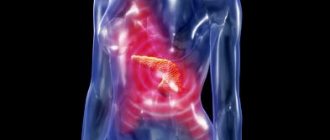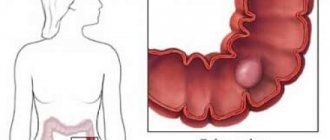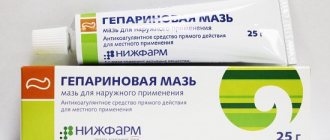What is congestive gastropathy
All consequences of inflammation in the digestive organ can be divided into two types: gastritis and gastropathy. The main difference between gastropathy and gastritis is the absence of strong changes in the mucous membrane of the organ. Only small areas of inflammation are present. But at the cellular level, there is damage to the organ - epithelial cells are destroyed, and their recovery occurs much more slowly.
The occurrence of congestive gastropathy occurs against the background of a violation of the diet, when taking certain types of medications, as a consequence of prolonged stress or as a complication of somatic diseases. Many patients suffering from this type of gastropathy have a history of trauma and surgical interventions on the digestive organ; gastropathy may also occur after burns, in the presence of liver cirrhosis and hypertension.
When a large volume of hot, spicy or rough food enters the stomach, the organ cannot fully digest such a quantity of food, which is why the surface of the mucous layer expands, more folds appear, which become thicker and higher. Microcirculation and vascular permeability become higher, more mucus and hydrochloric acid are produced. The stomach is trying to cope with the increased load.
Due to the ongoing overstretching of the antrum of the stomach, the work of the sphincter between the duodenum and the stomach begins to be disrupted - the closure does not occur tightly. For this reason, the contents of the small intestine and bile with pancreatic enzymes penetrate back into the stomach, thereby causing burns and atrophy of the surface of the mucous layer. This causes even more problems in the digestion process.
According to statistics, congestive gastropathy, based on the causes of its occurrence, is observed:
- in 24% of patients who used NSAIDs, with complications in the form of ulcerative manifestations.
- in 65-80% of patients who had stressful situations as a result of various injuries, operations, burns.
- 9-80% of patients with this diagnosis have a history of portal hypertension.
- 20-90% have liver cirrhosis.
Complications
Congestive gastropathy in the antrum is prone to complications. The most common of them include bleeding from pathologically altered vessels of the stomach. Sometimes, this is a late and only symptom of the disease. In more than half of patients diagnosed with gastropathy, fibrogastroscopy reveals ulcers, erosions and perforations.
The most dangerous complication is the development of a tumor process in the gastric mucosa. Since the process of restoration of the mucous membrane is disrupted, and the organ’s protective system works “to wear out,” uncontrolled cell growth may occur against the background of inflammation.
Types of disease
Congestive gastropathy is divided into 2 types:
- mild, when the gastric mucosa has a mosaic pattern, and the risk of bleeding is 3-30%;
- severe, in this case, submucosal hemorrhages and red diffuse spots appear against the background of a mosaic pattern, and the risk of bleeding ranges from 40 to 60%.
In addition, there is a division of congestive gastropathy into the following types:
- Congestive antral gastropathy . The lower region of the stomach, which is adjacent to the duodenum, is called the antrum. Its main task is mixing, grinding food to a size of 1.5-2 mm and pushing it through the pyloric sphincter into the duodenum. At the very beginning of the organ, the antral glands synthesize an alkaline secretion, with the help of which the effects of hydrochloric acid are neutralized. When the speed of movement of consumed food through the digestive tract decreases, stagnation processes appear, which lead to fermentation processes, increased release of hydrochloric acid and its effect on the gastric walls. This process contributes to the appearance of ulcers in the antrum of the stomach; the ulcer causes heartburn, provokes pain in the epigastric area, especially at night, and can manifest itself as vomiting. There is also a risk of complications in the form of bleeding, which indicates perforation.
- Focal congestive gastropathy . This type of gastropathy is characterized by the presence of individual local redness, which often occurs against the background of superficial gastritis. Left untreated, ulcers may develop.
- Erythematous-congestive gastropathy . This type of gastropathy is considered a pathological transformation of the gastric mucosa and looks like redness of its individual areas (focal) or significant surface areas (diffuse). Doctors often refer to it not as a disease, but only as a harbinger of gastropathy. When examining the surface of an organ using an endoscope, redness (erythema) is determined, indicating the presence of pathology. The rate of progression of the process depends on the individual resistance of the body and the duration of the influence of negative factors.
- Severe congestive gastropathy . With congestive gastropathy of this type, the surface of the organ has a granular surface, similar to a mosaic pattern, which occurs due to the fact that healthy areas alternate with damaged ones. This type of gastropathy is characterized by a vascular network, which has a pronounced character, can appear as local inflamed areas of red color and is easily confused with an ulcer during endoscopy.
Forms
Morphologically, there are two forms of congestive gastropathy - mild and severe. In mild cases, a mosaic pattern of folds and pathologically dilated vessels is found on the mucosa. In severe cases, there are also hemorrhages and inflammatory spots.
There is also gastropathy, which affects only the antrum of the stomach. It is located on the border with the duodenum, and the first is affected by chyme reflux. When stagnation occurs in the stomach, the passage of food through the antrum slows down, which leads to souring or fermentation of food. This increases the acidity of the environment and damages the mucous membrane. A person experiences pain at night, heartburn, nausea and vomiting.
Focal gastropathy is manifested by areas of redness against the background of gastric changes in the gastric mucosa. Ulcers may appear in these areas over time.
Causes
Congestive gastropathy does not cause structural transformations of the mucous membrane, only minor inflammatory foci are formed. This process is associated with functional deformation of cells or impaired gastric motility simultaneously with a stop in the evacuation of its contents. As a result, erythematous gastroduodenopathy occurs. It is reversible, but provokes many dyspeptic symptoms.
In the appearance of congestive gastropathy, a large role is played by hereditary predisposition. Also, the development of the disease can cause the following factors to affect the human body:
- smoking and alcohol abuse;
- severe head injuries (causing stress ulcers);
- age over 60 years;
- unhealthy diet: eating junk food, overeating (or, conversely, prolonged fasting, dieting);
- increased acidity of gastric juice;
- long-term use of anti-inflammatory non-steroidal drugs;
- presence of Helicobacter pylori in the body;
- prolonged stress;
- pancreatic diseases;
- a pancreatic tumor that causes an increase in gastrin levels in the blood;
- portal hypertension and liver cirrhosis;
- duodenogastric reflux.
Some of these factors cannot be controlled by a person, but for the development of congestive gastropathy, the presence of two or more factors from the list must be present.
Etiology
Congestive gastropathy is caused by frequent and uncontrolled use of non-selective NSAIDs (non-steroidal anti-inflammatory drugs). They are often prescribed because they have several positive effects at once: they reduce inflammation, reduce temperature and swelling, and relieve pain. But patients must adhere to certain conditions that they often ignore or consider unimportant.
The second cause of gastropathy can be called diseases of other systems and organs:
- pancreatic tumor;
- cirrhosis of the liver;
- portal hypertension.
Next in the ranking are accidents associated with the use of chemically active substances. In fourth place are permanent stress and head injuries. And only at the end of the list do gastrointestinal diseases appear, such as reflux of bile or intestinal contents back into the stomach, antiperistalsis.
Symptoms of congestive gastropathy
Gastropathy associated with stagnation of gastric contents can cause the development of the following symptoms:
- loss of appetite;
- vitamin deficiency, which is associated with impaired absorption of food;
- general exhaustion;
- nausea and subsequent vomiting, which can relieve the condition for a while;
- pain in the epigastric region;
- flatulence;
- the presence of a white coating on the tongue;
- presence of rotten odor from the mouth;
- dysbiosis.
These signs have varying degrees of intensity depending on the shape and prevalence of inflammatory foci.
With a prolonged course of congestive gastropathy, the development of structural failures and complications is possible. The most common consequence is a stomach ulcer. With timely initiation of therapy and lifestyle changes, you can completely get rid of the disease, since functional gastropathy is characterized by a reversible process.
At the very beginning of the development of congestive gastropathy, symptoms may be vague. Later, a whole complex of dyspeptic phenomena appears. With duodenogastric reflux, pain may be felt upon palpation of the abdomen, belching, heaviness in the stomach, and the tongue is coated.
The first signs of congestive gastropathy are often observed already at the stage of complications; they manifest themselves in the form of gastric bleeding.
Diagnosis of the disease
The primary diagnosis of congestive gastropathy occurs when the patient has characteristic signs of pathology. The atypicality of the symptoms of the disease complicates the diagnosis of congestive gastropathy. To make an accurate diagnosis, the doctor prescribes the following types of research:
- fibrogastroduodenoscopy. The flexible optical device used during the examination, which is inserted through the mouth, helps not only to visually assess the condition of the mucous membrane, but also to provide samples for histology. Not only areas damaged by pathology are subject to biopsy, but also healthy areas adjacent to them;
- Ultrasound;
- radiography with contrast.
These instrumental methods help to study the mucous membrane of the organ for the presence of an inflammatory process, erythema and possible ulceration. In addition, a breath test is performed to determine the presence of Helicobacter pylori in the body.
Among the laboratory tests that are considered mandatory are a general blood and urine test. Laboratory studies are based on general and detailed blood tests, enzyme immunoassay, and biochemical tests. Congestive gastropathy is characterized by low hemoglobin. With portal hypertension, which causes congestive gastropathy, a decrease in platelet levels may occur.
Histological analysis gives a picture of damage to the gastric walls.
MRI is used to determine possible abnormalities in the structure of the organ mucosa.
Differential diagnosis
Differential diagnosis of congestive gastropathy is considered a difficult task, since the symptoms of this disease are similar to other diseases of the gastroduodenal region.
Fibrogastroduodenoscopy helps to establish an accurate diagnosis visually and with the help of a biopsy. The most characteristic sign of pathology is considered to be an increase in volume, diffuse hyperemia of the mucous layer, but an accurate diagnosis is made after examining the material taken for a biopsy. These tests help differentiate congestive gastropathy from gastric polyposis.
Due to the fact that congestive gastropathy is often caused by taking NSAIDs and other medications, there is a need to separate drug-induced gastropathy from some other pathologies. When determining an ulcer of the mucous membrane of the digestive organ, “senile” ulcers and tumors should be excluded. The absence of markers for Helicobacter pylori infection indicates the absence of infection in the body.
How to treat congestive gastropathy
Therapy for congestive gastropathy must be comprehensive and include the use of medications, diet, normalization of the daily routine and diet.
Drugs are used that eliminate functional disorders and normalize gastrointestinal motility.
There are many medications to treat this disease:
- proton pump inhibitors;
- histamine H2 receptor blockers;
- antibiotics;
- antacids;
- cytoprotectors;
- drugs that help improve blood circulation.
The main role in the treatment of congestive gastropathy is given to substances that stop the synthesis of hydrochloric acid - proton pump inhibitors (PPIs). It takes at least 18 hours to resume the process. In addition, they have low interactions with other medications and are quite safe when taken over a long period of time. Proton pump inhibitors include the following drugs: Omeprazole, Lansoprazole, Rabeprazole.
"Rabeprazole" is a film-coated tablet, a single dose is 10-20 mg. The treatment regimen is prescribed by the doctor individually. Side effects include: nausea, vomiting, belching, flatulence, constipation, dizziness, insomnia, cough.
"Lansoprazole" are capsules that are taken orally at 30 mg at a time once a day. The duration of the course is 4 weeks. If necessary, the course is extended for another 2-4 weeks. Contraindications include: pregnancy in the first trimester, breastfeeding, allergy to the drug itself. Side effects: constipation or diarrhea, and occasionally there may be rashes on the body.
There are such drugs - blockers of H2-histamine receptors: Kvamatel, Ranitidine.
"Kvamatel" is administered intravenously, a dose of 20-40 mg suppresses the synthesis of hydrochloric acid for half a day. It is recommended to give injections of 20 mg twice a day. Contraindications: lactation period, pregnancy, childhood, presence of malignant neoplasms, hypersensitivity to the drug. Side effects: dry mouth, nausea, abdominal discomfort, increased fatigue, allergies.
Antacid drugs are represented by the following drugs: “Phosphalugel”, “Alka-Seltzer”, “Gasterin”, “Gastal”, “Rennie”.
"Rennie" are tablets, the effect of which is felt after 3-5 minutes. Single dose – 1-2 tablets, no more than 16 tablets per day. You can repeat the use of the medicine periodically every three hours. Contraindications to taking the drug: renal failure, hypercalcemia, hypersensitivity to the drug. Side effects include skin rashes. The drug is not dangerous for pregnant women.
The purpose of cytoprotectors is to ensure the integrity of the mucous membrane of the digestive organ and increase its resistance to an aggressive environment - these are bismuth preparations: Sucralfate, Pentoxifylline, De-nol.
Vitamins
Congestive gastropathy can lead to a decrease in the rate of absorption of vitamin B12, which causes its deficiency in the body. Vitamin deficiency is expressed in chronic fatigue, the presence of tinnitus, dizziness, emotional depression, headaches, decreased vision, and decreased mental abilities.
The vitamin is administered subcutaneously, intramuscularly and intravenously once or twice a day. A single dose is 0.1-0.2 g. For better absorption of the vitamin, it is better to take folic acid at the same time as consuming it, which helps the absorption process.
This vitamin is present in liver, beef, poultry, fish, seaweed, soy, milk, cheese, and eggs. In addition to drug treatment, physiotherapeutic methods are also used.
Physiotherapeutic treatment
This treatment consists of physical exercises and breathing exercises, which aim to strengthen the muscles of the peritoneum and internal digestive organs. Strong physical activity and walks in the fresh air tone the body, increase motor skills and improve blood supply to the stomach.
For pain, electrophoresis with papaverine and novocaine is used.
Among balneological procedures, it is good to drink mineral waters internally and take baths from them. For congestive gastropathy, drink half a glass of mineral water at room temperature an hour and a half before meals. When there is bleeding or ulcers that have degenerated into malignant tumors, hydrotherapy is not recommended.
Surgery
With congestive gastropathy, there may be cases when surgical intervention is necessary, which consists of removing damaged areas of the stomach. In this case, a full-fledged operation can be performed or a laparoscopic method can be used (hybrid operation or manually-assisted). Such operations are very effective, as they significantly reduce the duration and morbidity of surgery.
Diet for gastropathy
For patients with this disease, a gentle diet is recommended. To do this, you should stop eating fried, fatty, spicy foods, and completely quit smoking and alcoholic beverages. When cooking, it is better to give preference to the boiling or steaming method. It is better to eat food 5-6 times a day in small portions.
Traditional methods of treatment
Traditional methods of treatment are used in combination with medication and diet.
The following traditional medicine methods are used:
Unrefined vegetable oil (preferably olive) – 1 spoon, drink before meals.
Take mumiyo dissolved in milk, a third of a glass before meals for 10 days. Then they take a break for three days and repeat the course.
A good means of therapy is honey and products using it:
Mix warm oat decoction (0.5 cups) with 1 tsp. honey and drink this remedy 20 minutes before meals.
You can mix carrot juice with honey and take a quarter glass before meals three times a day.
Potato juice is also mixed with honey (100 ml of juice and 1 tsp of honey) and taken on an empty stomach three times a day.
Used for the treatment of congestive gastropathy and herbs. When using them, it is necessary to take into account the nature of their effect on the mucous membrane of the organ - inhibition or promotion of juice production. For low acidity, it is good to use calamus. Its root is crushed, one teaspoon of the root is infused in a glass of boiling water for half an hour and drunk before meals, a third of a glass at a time.
Aloe has a strong effect on the body during erosion, increased acidity, and heals inflamed areas of the mucous membrane. Drink fresh juice 1 tsp. half an hour before meals, it is allowed to add honey.
Homeopathic remedies
Homeopathy is also used to treat congestive gastropathy. The following drugs are used in treatment:
"Iberogast" - helps to normalize the motility of the gastrointestinal tract, reduces the symptoms of dyspepsia and spasms.
"Gastrokind" - stabilizes the activity of the digestive organs, relieves heaviness in the stomach, reduces the feeling of nausea and flatulence. Approved for use in pediatrics.
“Yazbin” - made from plant and animal ingredients, has an anti-inflammatory effect, helps stimulate the digestion process.
Treatment of bulbitis
Treatment of the digestive system is extremely variable. In the early stages, sometimes it is enough to reconsider your diet, and perhaps go on a strict diet and give up bad habits, such as:
- smoking;
- excessive caffeine consumption;
- alcohol consumption;
- abuse of spicy foods and synthetic carbonated drinks.
At this stage, it is important to exclude stress factors that affect the patient’s psycho-emotional state. Most diseases can be successfully treated with courses of drug therapy, which must be completed several times a year with regular adjustments of medications by a specialist who will also tell you where to do a gastroscopy to monitor the effectiveness of treatment.
Complex therapy and an individual approach are the main principles that guide the doctors of the Gorbakov Clinic when choosing treatment methods for each patient. Specialists develop a diet and prescribe drug therapy. The patient is prescribed drugs that reduce acidity, regulate gastrointestinal motility, as well as those that have an enveloping effect. If necessary, treatment for Helicobacter pylori and parasitic infections is prescribed. In some cases, the patient is examined by an immunologist who prescribes additional restorative drugs, an endocrinologist, if there is concomitant endocrine pathology, and other specialists.
Prevention
The appearance of congestive gastropathy can be prevented by following a diet and eating small amounts of food. It is recommended to forget about bad habits and avoid stressful situations.
When the first symptoms of congestive gastropathy appear, a correct and timely diagnosis should be made and adequate treatment should begin.
List of references: https://professor.perm.ru/klinika/novosti-i-aktsii/201-gastropatiya-prichiny-vidy-simptomy.html https://ilive.com.ua/health/zastoynaya-gastropatiya-antralnaya- eritematoznaya-tela-i-antruma-zheludka_122771i15938.html Congestive portal gastropathy in children // Medical Bulletin of the North Caucasus. 2022. No. 2. https://medcenter.kiev.ua/zastojnaya-gastropatiya/ Notes from the author of the article, based on personal experience. This material is purely subjective and is not a guide to action. Only a qualified specialist can determine an accurate diagnosis and prescribe treatment.
Last modified: 03/17/2020
